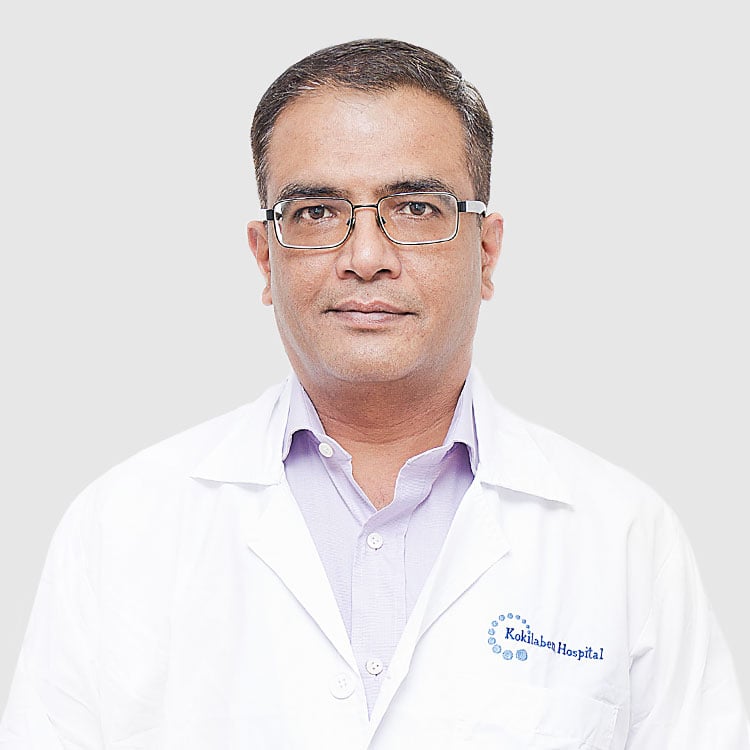Gynaecologic Oncology is a subspecialty of Obstetrics and Gynecology that focuses on diagnosing and treating women with cancers of the reproductive system. Cancers can occur in any part of the female reproductive system–the vulva, vagina, cervix, uterus, fallopian tubes, or ovaries. These cancers are called gynaecologic cancers. Each woman with gynaecological cancer has unique medical and emotional needs. To meet these needs, Kokilaben Hospital has highly qualified experts who specialise in different modalities of cancer care and work as a team, backed by cutting-edge technology.
The Gynecological Oncology services provide a full-range of womens health care, including Diagnostic, Consultative and Treatment services. Following services are offered by our Gynecological Oncology unit.
Uterine cancer, also known as endometrial carcinoma, is the abnormal (malignant) growth of cells that comprise uterine tissue. Currently, we are seeing a rising incidence in endometrial carcinoma cases. Almost 75 per cent of these cancers develop in postmenopausal women, with < 5 per cent of cancers seen in women under 40 years of age.
| Stage I | 85 - 90 per cent |
| Stage IV | 20 - 25 per cent |
Cervical cancer is a malignant tumour of the cervix, the lowermost part of the uterus. India contributes almost one-third of new cases diagnosed worldwide, and unfortunately 70-90 per cent of cases are diagnosed at an advanced stage. Cervical cancer is preventable, as there is an effective screening test available to detect precancerous changes that can be treated; thus, progression to cancer can be stopped.
Youngest girl of 4 years operated for fertility preserving cervical gynae surgery.
| Stage I | 80 - 85 per cent |
| Stage IV | 15 - 20 per cent |
| Surgical Morbidity | 1 - 1.5 per cent |
Ovarian cancer is cancer that develops in the female organs that produce eggs–the ovaries. It is the third most common cancer seen in women in India after cervical and breast cancer. The incidence of ovarian cancer in India is 7-9/100,000 women per year; 85-90 per cent of women with ovarian cancer are over 40 years of age with the peak incidence between 55 and 65 years of age. In India, 23,000 - 25,000 new cases of ovarian cancer are diagnosed every year.
Early diagnosis is essential for better chances of cure
Majority of ovarian cancer patients require surgery and chemotherapy. The decision to perform surgery first is based on imaging findings (CT scan/MRI). The majority of patients are first offered surgery as a treatment option but if the disease is very advanced and surgery is not possible, chemotherapy can be considered; 60-70 per cent of ovarian cancer cases can be operated first.
| Stage I | 75-85 per cent |
| Stage IV | 15-20 per cent |
| Surgical Morbidity | 3-7 per cent |
After treatment, you following tips may help you get rid of some side effects:
Background and diagnosis : A 29-year-old lady was recently diagnosed with cervical cancer and was advised surgery. This would essentially have rendered her infertile as conventional surgery for cervical cancer requires complete removal of the uterus. However, she wanted to preserve her fertility. Fertility preservation surgery (radical trachelectomy) is an accepted treatment for cervical cancer but there are strict criteria to identify eligible patients. We carried out essential tests after which she was identified as a suitable patient for the procedure.
Treatment : We discussed and counselled the patient and her husband about the surgery and the advantages of using the robotic platform. She underwent robotic radical trachelectomy with a bilateral pelvic lymph node dissection at Kokilaben Hospital.
Outcome : Her postoperative recovery was uneventful and she was discharged from the hospital on the fifth day after her surgery. She will be closely observed for a period of one year; if things remain fine, she can attempt pregnancy.
Kokilaben Hospital has one of the most comprehensive cancer centres, offering all aspects of cancer care from prevention, screening and early detection, advanced imaging (including PET CT) to surgery, radiation and chemotherapy all under one roof. We understand that each woman with Gynaecological Cancer has unique medical and emotional needs. In order to address these needs we have highly qualified experts who specialise in different modalities of cancer care and work as a team, backed up by the cutting edge technology .This multidisciplinary team has a precise stepwise, goal directed approach for evaluation planning and treatment delivery, based on the available evidence. All the members of the team work with one goal To Make a Difference in the Fight with Cancer.

Cancer/Surgical Oncology, Robotic Surgery, Gynaecology & Obstetrics, Minimal Access Surgery
Gynecologic Oncology, Robotic GyneOncosurgery, Ovarian Cancer Cytoreductive Surgery, Fertility Preservation surgery